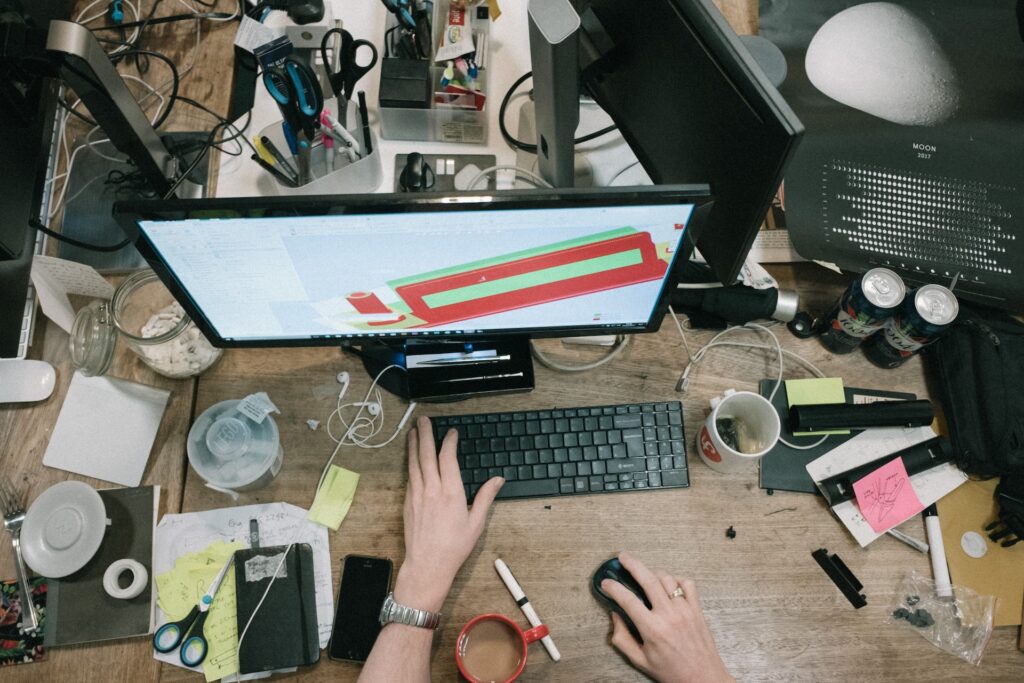Breaking the Busyness Cycle
by Jessica Nusbaum
Today’s Tuesday Reading is from Jessica Nusbaum, Director of Communications and Marketing at the UC Davis Library. She is a current MOR program participant. Jessica may be reached at [email protected] or via LinkedIn.
I tend to say “yes” to everything. There are many reasons: Genuine intellectual interest. Wanting to be helpful. Not wanting to disappoint anyone. A belief (this is the kicker) that I’m the only one who can do it or do it well.
For a long time, this served me well enough — I got to work on exciting projects, I built relationships across the organization, people valued my contributions — and I “handled” the extra work by working more. But it all became too much (surprise, surprise!). My MOR 360 colleague feedback reflected this, and I knew it too. So what to do?
As I’ve reflected and learned, I’ve created a few new practices to begin breaking the busyness cycle.
Creating a Rubric for “Yes.” Before taking on a new task or project, I try to ask myself these questions:
- Is this task a strategic priority for the organization?
(Side note: If not, consider how to respond to the person to whom it is vital so as not to devalue their idea or request.)
- If it is a strategic priority, how urgent is it?
- Who else could do this?
- If there is no one else who could do it, why not?
The first two questions have already helped me say no to some things that, in the past, I would have immediately jumped in and started doing but, upon reflection, didn’t need to happen right away (or, in one case, at all).
The last two questions have helped me consider, in other situations, whether my skills, experience, or role truly make me uniquely positioned to do something or whether I haven’t taken the time to train, coach, or empower someone else to do it. Which, of course, points to the need to delegate.
Don’t Delegate. Entrust. Unfortunately, this ran headlong into a mental block about delegation: Even if I could train or coach someone else to do something, wasn’t it unfair to offload my busyness onto them?
Our MOR workshop conversations about enabling others to grow and learn helped reframe my thinking. By holding onto specific tasks, I wasn’t protecting my team from being overwhelmed; I was holding back potential learning opportunities (and overwhelming myself in the process!).
Now, rather than wincing at the idea of “Can you do this because I don’t have time to get to it?” I seek opportunities to entrust tasks or projects to others so they can learn, feel ownership, and see their work being valued. And what I’ve found so far is that when I do, they virtually always say “yes” without batting an eye. More and more, I try to remember that planning a meeting agenda is also about planning action items for the team so everyone has a role.
The Payoff. A month or so after committing to this new way of working, I went on vacation with my family for two weeks — the kind of vacation where you don’t bring a computer. And this time, rather than telling colleagues, “Text me if anything comes up!” or facing a backlog when I returned, I invested time before I left in training, coaching, and deliberate handoffs of specific projects, and made it clear in my out-of-office response who to contact about different types of questions.
And you know what happened? When I peeked at email on my phone every couple of days, what I saw was things getting handled. When crises and questions came up, the team dealt with them. Their approach may have differed from mine, but it got done. And that’s what mattered.
They also learned and grew, which mattered, too. I caught two things that I needed to forward to someone else — but it was just that. I forwarded them; I didn’t do them. Not only did I get to enjoy a real vacation, but reentry wasn’t so bad either because the things got done by someone else.
The take-home message is something I’ve known for a long time, but I always need to be reminded of: Yes, you have unique contributions to offer. But you don’t have to do this alone.

How well do you delegate or entrust to others?
- Omg, it is such a challenge for me to delegate.
- I’m getting better at it, but still have a ways to go.
- I’m okay enough with my ability to delegate.
- I generally feel I delegate well.
- I feel like the ability to delegate is a considerable strength of mine: when there’s a task to be done, I think about the whole team, not just my own to-do list.
Last week, we asked which characteristic of grit resonates most.
- 28% said they are leaning on relationships to accomplish goals.
- 26% said challenges don’t phase them.
- 24% said overcoming obstacles to reach goals.
- 17% said they persevere to finish what they start.
- 5% said being aware of their emotional buttons and managing their response.
We were pretty evenly split between leaning on relationships, not being phased by challenges, and overcoming obstacles as the characteristics of grit that resonated in achieving our goals. These ideas are all closely related. Relationships provide a foundation for overcoming obstacles through encouragement or assistance. Likewise, the support of others can mitigate the impact we feel from challenges. Speaking of our feelings, while only 1 in 20 of us resonated most with understanding and managing our emotional responses, that is a vital part of grit. Whatever goals we may have, grit can help us to get there, including controlling our busyness, as we saw in this week’s reading.

- February 2026 (5)
- January 2026 (4)
- December 2025 (3)
- November 2025 (5)
- October 2025 (5)
- September 2025 (5)
- August 2025 (7)
- July 2025 (5)
- June 2025 (4)
- May 2025 (5)
- April 2025 (5)
- March 2025 (4)
- February 2025 (5)
- January 2025 (4)
- December 2024 (3)
- November 2024 (4)
- October 2024 (5)
- September 2024 (4)
- August 2024 (4)
- July 2024 (5)
- June 2024 (5)
- May 2024 (4)
- April 2024 (5)
- March 2024 (5)
- February 2024 (4)
- January 2024 (6)
- December 2023 (3)
- November 2023 (4)
- October 2023 (5)
- September 2023 (4)
- August 2023 (4)
- July 2023 (4)
- June 2023 (4)
- May 2023 (5)
- April 2023 (4)
- March 2023 (1)
- February 2023 (1)
- January 2023 (4)
- December 2022 (3)
- November 2022 (6)
- October 2022 (4)
- September 2022 (4)
- August 2022 (6)
- July 2022 (3)
- June 2022 (4)
- May 2022 (5)
- April 2022 (4)
- March 2022 (4)
- February 2022 (2)
- January 2022 (4)
- December 2021 (3)
- November 2021 (4)
- October 2021 (3)
- September 2021 (4)
- August 2021 (4)
- July 2021 (4)
- June 2021 (4)
- May 2021 (4)
- April 2021 (4)
- March 2021 (5)
- February 2021 (4)
- January 2021 (4)
- December 2020 (4)
- November 2020 (4)
- October 2020 (6)
- September 2020 (5)
- August 2020 (4)
- July 2020 (7)
- June 2020 (7)
- May 2020 (5)
- April 2020 (4)
- March 2020 (5)
- February 2020 (4)
- January 2020 (4)
- December 2019 (2)
- November 2019 (4)
- October 2019 (4)
- September 2019 (3)
- August 2019 (3)
- July 2019 (2)
- June 2019 (4)
- May 2019 (3)
- April 2019 (5)
- March 2019 (4)
- February 2019 (3)
- January 2019 (5)
- December 2018 (2)
- November 2018 (4)
- October 2018 (5)
- September 2018 (3)
- August 2018 (3)
- July 2018 (4)
- June 2018 (4)
- May 2018 (5)
- April 2018 (4)
- March 2018 (5)
- February 2018 (5)
- January 2018 (3)
- December 2017 (3)
- November 2017 (3)
- October 2017 (5)
- September 2017 (3)
- August 2017 (5)
- July 2017 (3)
- June 2017 (8)
- May 2017 (5)
- April 2017 (4)
- March 2017 (4)
- February 2017 (4)
- January 2017 (4)
- December 2016 (2)
- November 2016 (7)
- October 2016 (5)
- September 2016 (8)
- August 2016 (5)
- July 2016 (4)
- June 2016 (12)
- May 2016 (5)
- April 2016 (4)
- March 2016 (7)
- February 2016 (4)
- January 2016 (10)
- December 2015 (4)
- November 2015 (6)
- October 2015 (4)
- September 2015 (7)
- August 2015 (5)
- July 2015 (6)
- June 2015 (12)
- May 2015 (4)
- April 2015 (6)
- March 2015 (10)
- February 2015 (4)
- January 2015 (4)
- December 2014 (3)
- November 2014 (5)
- October 2014 (4)
- September 2014 (6)
- August 2014 (4)
- July 2014 (4)
- June 2014 (4)
- May 2014 (5)
- April 2014 (5)
- March 2014 (5)
- February 2014 (4)
- January 2014 (5)
- December 2013 (5)
- November 2013 (5)
- October 2013 (10)
- September 2013 (4)
- August 2013 (5)
- July 2013 (8)
- June 2013 (6)
- May 2013 (4)
- April 2013 (5)
- March 2013 (4)
- February 2013 (4)
- January 2013 (5)
- December 2012 (3)
- November 2012 (4)
- October 2012 (5)
- September 2012 (4)
- August 2012 (4)
- July 2012 (5)
- June 2012 (4)
- May 2012 (5)
- April 2012 (4)
- March 2012 (4)
- February 2012 (4)
- January 2012 (4)
- December 2011 (3)
- November 2011 (5)
- October 2011 (4)
- September 2011 (4)
- August 2011 (4)
- July 2011 (4)
- June 2011 (5)
- May 2011 (5)
- April 2011 (3)
- March 2011 (4)
- February 2011 (4)
- January 2011 (4)
- December 2010 (3)
- November 2010 (4)
- October 2010 (4)
- September 2010 (3)
- August 2010 (5)
- July 2010 (4)
- June 2010 (5)
- May 2010 (4)
- April 2010 (3)
- March 2010 (2)
- February 2010 (4)
- January 2010 (4)
- December 2009 (4)
- November 2009 (4)
- October 2009 (4)
- September 2009 (4)
- August 2009 (3)
- July 2009 (3)
- June 2009 (3)
- May 2009 (4)
- April 2009 (4)
- March 2009 (2)
- February 2009 (3)
- January 2009 (3)
- December 2008 (3)
- November 2008 (3)
- October 2008 (3)
- August 2008 (3)
- July 2008 (4)
- May 2008 (2)
- April 2008 (2)
- March 2008 (2)
- February 2008 (1)
- January 2008 (1)
- December 2007 (3)
- November 2007 (3)
- October 2007 (3)
- September 2007 (1)
- August 2007 (2)
- July 2007 (4)
- June 2007 (2)
- May 2007 (3)
- April 2007 (1)
- March 2007 (2)
- February 2007 (2)
- January 2007 (3)
- December 2006 (1)
- November 2006 (1)
- October 2006 (1)
- September 2006 (3)
- August 2006 (1)
- June 2006 (2)
- April 2006 (1)
- March 2006 (1)
- February 2006 (1)
- January 2006 (1)
- December 2005 (1)
- November 2005 (2)
- October 2005 (1)
- August 2005 (1)
- July 2005 (1)
- April 2005 (2)
- March 2005 (4)
- February 2005 (2)
- December 2004 (1)